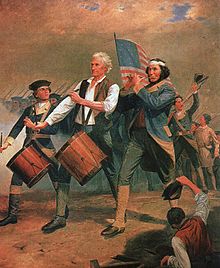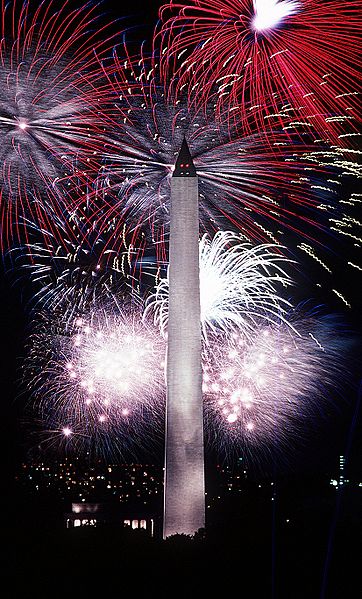My knowledge of American History may not be great, but even I know that July 4th is their big day. But why?
July 4th, 1776, was the day that the Continental Congress of the thirteen American colonies, who were then at war with Great Britain, adopted the Declaration of Independence – announcing that they were now an independent nation, the ‘United States of America’, and thus no longer a part of the British Empire. This announcement was somewhat premature – in fact the war with Britain continued for another seven years.
The ‘American War of Independence’ had started a year earlier, after a long period in which the American colonies had been dissatisfied with their treatment by the parliament of Great Britain. The Stamp Act of 1765 had insisted on the right of Great Britain to tax the colonists, and the famous Boston Tea Party of 1773 was a rejection of the East India Company’s monopoly over selling taxed tea into America.
The colonies formed a Continental Congress in 1774. Paul Revere made his famous ride warning of British troop activity in April 1775, and the battles of Lexington and Concord followed soon after. These battles ignited the war. George Washington was appointed Commander-in-Chief of the American army in June 1775.
About 20% of Americans remained loyal to the crown, and the British forces were also supplemented by 30,000 German troops. The American colonies were supported by the French.
After a decisive victory in Yorktown in 1781, the colonists prevailed, and Britain eventually formally surrendered in the treaty of Paris in 1783.
Back to 1776. Congress entrusted the drafting of ‘The Declaration of Independence’ to a committee of five – Thomas Jefferson, the ubiquitous Benjamin Franklin, John Adams, Roger Sherman, and Robert Livingstone.
The first sentence of the Declaration asserts as a matter of Natural law the ability of a people to assume political independence
When in the Course of human events, it becomes necessary for one people to dissolve the political bands which have connected them with another, and to assume among the powers of the earth, the separate and equal station to which the Laws of Nature and of Nature’s God entitle them, a decent respect to the opinions of mankind requires that they should declare the causes which impel them to the separation.
The next section, the famous preamble, includes the ideas and ideals that were principles of the Declaration.
We hold these truths to be self-evident, that all men are created equal, that they are endowed by their Creator with certain unalienable Rights, that among these are Life, Liberty and the pursuit of Happiness. That to secure these rights, Governments are instituted among Men, deriving their just powers from the consent of the governed, That whenever any Form of Government becomes destructive of these ends, it is the Right of the People to alter or to abolish it, and to institute new Government, laying its foundation on such principles and organizing its powers in such form, as to them shall seem most likely to effect their Safety and Happiness. Prudence, indeed, will dictate that Governments long established should not be changed for light and transient causes; and accordingly all experience hath shewn, that mankind are more disposed to suffer, while evils are sufferable, than to right themselves by abolishing the forms to which they are accustomed. But when a long train of abuses and usurpations, pursuing invariably the same Object evinces a design to reduce them under absolute Despotism, it is their right, it is their duty, to throw off such Government, and to provide new Guards for their future security.
The Declaration then outlines the charges against George III, and then finally asserts the independence of the colonies.
We, therefore, the Representatives of the united States of America, in General Congress, Assembled, appealing to the Supreme Judge of the world for the rectitude of our intentions, do, in the Name, and by Authority of the good People of these Colonies, solemnly publish and declare, That these United Colonies are, and of Right ought to be Free and Independent States; that they are Absolved from all Allegiance to the British Crown, and that all political connection between them and the State of Great Britain, is and ought to be totally dissolved; and that as Free and Independent States, they have full Power to levy War, conclude Peace, contract Alliances, establish Commerce, and to do all other Acts and Things which Independent States may of right do. And for the support of this Declaration, with a firm reliance on the protection of divine Providence, we mutually pledge to each other our Lives, our Fortunes and our sacred Honor.
Independence Day has been celebrated every year in America since 1776. ‘The Star Spangled Banner’ has only been the official US anthem since 1931, although it has been a popular patriotic song for almost 200 years. It is based on a 1814 poem by Francis Scott Key, to the tune of a popular British drinking song of the time.
O! say can you see by the dawn’s early light,
What so proudly we hailed at the twilight’s last gleaming,
Whose broad stripes and bright stars through the perilous fight,
O’er the ramparts we watched, were so gallantly streaming?
And the rockets’ red glare, the bombs bursting in air,
Gave proof through the night that our flag was still there;
O! say does that star-spangled banner yet wave,
O’er the land of the free and the home of the brave?
Add a comment








 RSS - Posts
RSS - Posts

